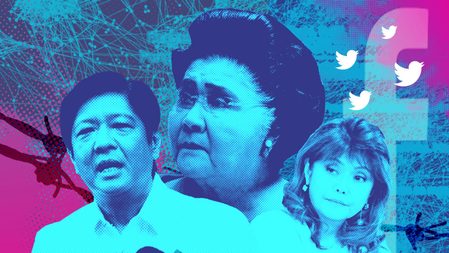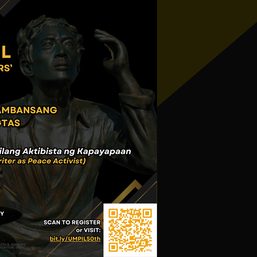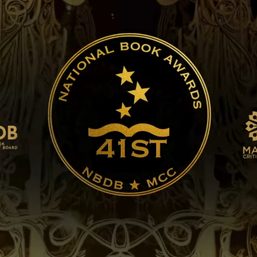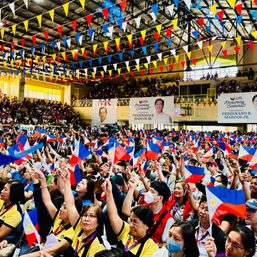SUMMARY
This is AI generated summarization, which may have errors. For context, always refer to the full article.
![[OPINION] We need workable stories for our political life](https://www.rappler.com/tachyon/2021/07/We-need-workable-stories-for-our-political-life-sq.jpg)
This morning, I was looking at my copy of the day’s tabloid. One of the headlines was directed at a food delivery app. It read: “Wag Tratuhing Hayop Mga Rider.” When I read the article, however, there was no mention of “hayop” in the quote from the labor secretary — although he insisted on better ways of negotiating with food riders.
Not long after this, I saw a post by a friend on Facebook. It had an article about a statement by the president against a previous foreign affairs secretary. The article, which presents a claim that the former received aid from China for the upcoming elections, quotes him as saying “Daldal ka nang daldal diyan. Anong China magtulong sa akin? G-go ka. Saan mo nakuha ‘yan?”
Both of the articles I saw struck me as having a clear character and a clear story. The character is a person with a sharp tongue and brash manners. This person is someone who fights against what is unjust — and indeed, both unfair labor practices and false accusations can be seen as unjust.
It seems to me that the consumers of tabloids and online news — reasonable to think this would be a good number of Filipinos — are being fed an implied storyline with this kind of character at the center. Doesn’t the image of a boxer being ganged up on within his political party, a mayor punching an erring aid, and many other antics on the television and internet, fit this mold?
When we talk of stories and characters, we touch on the study of literature. The other day, I chanced upon an essay by National Artist Edith Tiempo, who once taught about these terms. I remember her inclination to complexity in the rendering of characters in fiction, and their differences from less complex ones which also served other literary purposes.
Tiempo’s essay spoke of exigent literature, to which propaganda belongs: “We do believe in the use of some propagandistic writing for dealing with immediate demands for the good of society; this paper only wishes to make a distinction between exigent literature, and literature that holds for us our heritage of bedrock and enduring values as a people; and to draw attention to the national myths that have survived, by whose authority and wisdom we may all be proud to be led to our goals.”
I am concerned about the need for a better administration in the coming years, one that honors human rights and wherein there are clearer efforts towards the appropriate use of resources. I trust that goodness of character is something held safe in our myths. However, the current political players more inclined to a straighter path, so to speak, seem to be more focused on making systems work rather than telling stories with indelible characters and simple storylines that touch on our myths — a possibly counterintuitive act that, in the end, might be strategic in getting votes.
I have been advised that the running of political parties requires much work and has very many aspects to attend to. For sure, the elements of money and influence need to be harnessed — and in light of these, do members have the time, energy, manpower, and resources to focus on what might be seen as negligible? Literature and the humanities, surely, have seen better days.
Moreover, I agree with others who see the need to move away from characters and stories. I agree that careful study and discernment are necessary for the maturing of the nation. However, making this happen requires the availability and the openness to a good education. Elitism has made both difficult to reach, and in the meantime, there is the need for votes for a workable administration.
For now, as the election comes upon us, as we are beset with characters and stories such as the ones in the tabloid — very similar to others we’ve seen in various forms of media — I think we need to harness the power of stories which Tiempo recognized and elucidated.
There may be a revulsion against this given the way the Marcos regime used stories, characters, images, and art in general to manipulate the Filipino people. As both writer and musician, I have been witness to how persons continue to be fascinated with the despotic couple — because they portrayed themselves as connected to our myths and possessed by a largesse which is confirmed, thanks to a ruling by a judicial body, to have been built on graft.
Still and all, the use of various languages captures the attention of people. It is through this that corrupt people are made memorable, their oppression long-lasting.
We can continue to develop better and more ethical approaches to governance and — perhaps playfully, because there is so much to do — shape more striking characters and workable stories for our political life. – Rappler.com
Niccolo Rocamora Vitug is a literature professor at the University of Santo Tomas, and an editorial staff member of the university’s UNITAS Journal. He is also working on his doctorate at the University of the Philippines’ College of Music. His collection of poetry in English, Enter Deeply, was published by the University of the Philippines Press.
Add a comment
How does this make you feel?

![[WATCH] In The Public Square with John Nery: Preloaded elections?](https://www.rappler.com/tachyon/2023/04/In-the-Public-Square-LS-SQ.jpg?resize=257%2C257&crop=414px%2C0px%2C1080px%2C1080px)
![[Newspoint] 19 million reasons](https://www.rappler.com/tachyon/2022/12/Newspoint-19-million-reasons-December-31-2022.jpg?resize=257%2C257&crop=181px%2C0px%2C900px%2C900px)

![[OPINION] The long revolution: Voices from the ground](https://www.rappler.com/tachyon/2022/06/Long-revolution-June-30-2022.jpg?resize=257%2C257&crop=239px%2C0px%2C720px%2C720px)
![[OPINION] I was called a ‘terrorist supporter’ while observing the Philippine elections](https://www.rappler.com/tachyon/2022/06/RT-poster-blurred.jpeg?resize=257%2C257&crop_strategy=attention)


![[Newsstand] The Marcoses’ three-body problem](https://www.rappler.com/tachyon/2024/04/tl-marcoses-3-body-problem.jpg?resize=257%2C257&crop=451px%2C0px%2C1080px%2C1080px)
![[Edgewise] Preface to ‘A Fortunate Country,’ a social idealist novel](https://www.rappler.com/tachyon/2024/02/a-fortunate-country-february-8-2024.jpg?resize=257%2C257&crop_strategy=attention)
![[New School] When barangays lose their purpose](https://www.rappler.com/tachyon/2024/02/new-school-barangay.jpg?resize=257%2C257&crop=414px%2C0px%2C1080px%2C1080px)






![[EDITORIAL] Ang low-intensity warfare ni Marcos kung saan attack dog na ang First Lady](https://www.rappler.com/tachyon/2024/04/animated-liza-marcos-sara-duterte-feud-carousel.jpg?resize=257%2C257&crop=294px%2C0px%2C720px%2C720px)
![[Free to disagree] How to be a cult leader or a demagogue president](https://www.rappler.com/tachyon/2024/04/TL-free-to-disagree.jpg?resize=257%2C257&crop_strategy=attention)
![[OPINION] Can Marcos survive a voters’ revolt in 2025?](https://www.rappler.com/tachyon/2024/04/tl-voters-revolt-04042024.jpg?resize=257%2C257&crop=251px%2C0px%2C720px%2C720px)
![[Edgewise] Quo vadis, Quiboloy?](https://www.rappler.com/tachyon/2024/03/quo-vadis-quiboloy-march-21-2024.jpg?resize=257%2C257&crop_strategy=attention)
There are no comments yet. Add your comment to start the conversation.